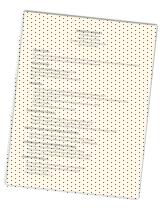This morning, one of our
Community Business College graduates called and asked for a bit of advice –
Should she send her resume to a potential employer in the Microsoft Word format
or should she send it as a .pdf file?
Here’s why she asked – She said she first attached it as a Word
document for convenience sake but when she tested it and re-opened it, the
resume lost some of its formatting. Not bad, mind you, but it did throw some
text onto a second page and the margins shifted some.
Our advice to her was to send a
second e-mail using the pdf format which does not have the changing formatting
issues and offer it to the employer an option with a note to saying something
like, “I thought I’d also send you a pdf copy of my resume so that you have a
choice to use the format you prefer.”
Now we’ll wait to see if she gets
the job interview.
So just what are the rules on
file attachment in sending your resume to employers?
The Golden Rule on resume
attachments is – first always do what the employer asks. If the employer asks
for resumes but “no attachments,” for example, then do not attach anything, but copy and paste your resume. If the
employer asks for “no Word documents,” then do not send word documents.
Advantages of the Microsoft Word Format
1.
One advantage to sending a native Microsoft Word
document is the job seeker can just send the most current resume and doesn’t
have to worry about different versions.
2.
The second advantage is the employer who receives your
Word document can open the document without any additional software (e.g. Adobe
Acrobat Reader) and can then copy the data over into either other hiring
software or a template used to hire candidates.
Disadvantages of the Microsoft Word Format
1.
One reason employers may ask for “no Word documents” be
sent is some Word documents can carry viruses and malicious code that can hurt
the recipients computers.
2.
As in our graduate’s case, you probably won’t know
which version of Microsoft Word that the employer is using. If you have saved
your Word document in a more current version than the employer, the formatting
may get a little funky. It’s still going to be legible and the document can
still be used but it won’t be perfect. Remember, resumes
should be as perfect as possible. Sometimes little imperfections serve as
an excuse for a screener to reject a given resume without having to read it
further.
Advantages of the Microsoft Adobe PDF Format
PDF stands for Portable
Document Format and is usually used to present and exchange documents
reliably and works equally well across different hardware and operating systems.
Invented in the 1990s, Adobe’s PDF has
become the standard format for document sharing.
1.
Because the PDF format is now an open standard maintained
by the International Organization for Standardization, PDFs look the same the
world over. The type of machine doesn’t matter and the operating system an
employer might be using doesn’t matter either. As long as they have the free Acrobat Reader DC
software they can see any pdf document the same way it was sent.
In that sense,
this makes it closer to a piece of paper than almost any other digital format.
2.
Most other software programs now recognize the PDF
format and will open or import .pdf files without any problem.
Disadvantages of the Microsoft Adobe PDF Format
1.
Sending in PDF takes an extra step and requires you to
track more than one document. When you convert your resume from Microsoft Word
to a .pdf document, you are creating one more file to keep track of.
Say, for example, you’re applying
for a job today and you convert your resume to a .pdf format and send it off.
Next week, another job opportunity comes along and you want to make some
changes and send it again. Now you’ll have another version of your resume.
After a few times of this, you can end up with a whole bunch of versions of
your resume that can get confusing.
A simple way
to fix this is to always create a new
pdf before sending it. Then, delete it from your storage file after you’ve
submitted it. This way the Microsoft Word document is always the most current form of your resume.
Another option is to use the same
file name when saving your .pdf document. Here’s an example:
BenFranklinResume.pdf. Then, the new .pdf file replaces the old one and you’ll
only have one file to worry about.
2.
Although most pdf documents can allow for text to be
copied in the document, some are locked. If, instead converting the Microsoft
Word document to .pdf, you scanned it off a printed copy, it might even be more
difficult to extract text.
Unless otherwise directed
(remember the Golden Rule), Community Business College recommends using
the .pdf format when submitting resumes.
Need
to learn more Microsoft Word tricks? Take a Microsoft Word class with us. You
can purchase a short course directly
from Community Business
College at http://www.cbcwebcollege.com/shopcart/
 Do you find the job search
process frustrating? Try taking a class on finding a job with our
six-week, instructor-led online course at: http://www.ed2go.com/cbc123/online-courses/12-steps-to-successful-job-search
Do you find the job search
process frustrating? Try taking a class on finding a job with our
six-week, instructor-led online course at: http://www.ed2go.com/cbc123/online-courses/12-steps-to-successful-job-search













